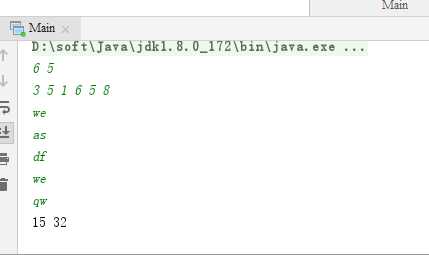标签:system sys 输入 rap 一段 ash 拉丁字母 http entry
过年啦!小B高兴的不行了,她收到了很多红包,可以实现好多的愿望呢。小B可是对商店货架上心仪的货物红眼好久了,只因囊中羞涩作罢,这次她可是要大大的shopping一番。小B想去购物时,总是习惯性的把要买的东西列在一个购买清单上,每个物品单独列一行(即便要买多个某种物品),这次也不例外。
小B早早的来到了商店,由于她太激动,以至于她到达商店的时候,服务员还没有把各个商品的价签排好,所有的价签还都在柜台上。因此还需要一段时间,等服务器把价签放到对应的商品处,小B才能弄清她的购买清单所需的费用。
小B都有些迫不及待了,她希望你能够根据购买清单,帮她算算最好和最坏的情况下所需的费用,你能帮她吗?
输入中有多组测试数据。每组测试数据的第一行为两个整数n和m(1=<n, m=<1000),分别表示价签的数量以及小B的购买清单中所列的物品数。第二行为空格分隔的n个正整数,表示货架上各类物品的价格,每个数的大小不超过100000。随后的m行为购买清单中物品的名称,所有物品名称为非空的不超过32个拉丁字母构成的字符串,保证清单中不同的物品种类数不超过n,且商店有小B想要购买的所有物品。
5 3
4 2 1 10 5
apple
orange
mango
6 5
3 5 1 6 8 1
peach
grapefruit
banana
orange
orange
对每组测试数据,在单独的行中输出两个数a和b,表示购买清单上所有的物品可能需要的最小和最大费用。
7 19
11 30
import java.util.*;
public class Main {
public static void main(String[] args) {
Scanner in = new Scanner(System.in);
while(in.hasNext()) {
int n = in.nextInt();
int m = in.nextInt();
List<Integer> listPrice = new ArrayList<Integer>();
for(int i=0;i<n;i++) {
listPrice.add(in.nextInt());
}
Collections.sort(listPrice);
HashMap<String,Integer> hashMap = new HashMap<String, Integer>();
for(int i=0;i<m;i++) {
String name = in.next();
Integer num = hashMap.get(name);
if(hashMap.containsKey(name)) {
hashMap.put(name,num+1);
}else {
hashMap.put(name,1);
}
}
List<Map.Entry<String,Integer>> list = new ArrayList<Map.Entry<String,Integer>>(hashMap.entrySet());
Collections.sort(list,new Comparator<Map.Entry<String,Integer>>() {
//降序排序
public int compare(Map.Entry<String, Integer> o1,
Map.Entry<String, Integer> o2) {
return (o2.getValue() - o1.getValue());
}
});
int min = 0;
int max = 0;
// 1 1 2 3 4 5 5
for(int i=0;i<list.size();i++) {
min += list.get(i).getValue()*listPrice.get(i);
max +=list.get(i).getValue()*listPrice.get(n-1-i);
}
System.out.println(min+" "+ max);
}
}
}

标签:system sys 输入 rap 一段 ash 拉丁字母 http entry
原文地址:https://www.cnblogs.com/lick468/p/11406617.html